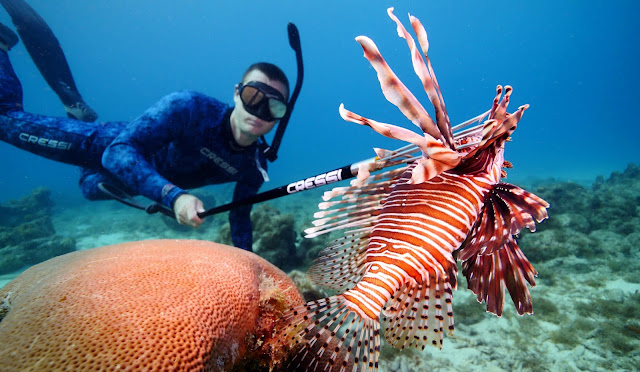Pages
Sub Sea Systems — Our World is a blog dedicated to the unique experiences of Sub Sea Systems — Immerse yourself in our incredible adventures, company culture, and innovative programs and products.
Wednesday, February 27, 2019
Lionfish Are Evil. Let’s Eat Them.
There’s no argument lionfish are beautiful. Their warmly colored stripes and lace-like edges make them a prized addition to home aquariums.
While lionfish are lovely to look at, they can also be quite destructive and dangerous. In fact, red lionfish are now recognized as one of the most important conservation issues in the world. In the Caribbean and Atlantic waters, they lack any natural predators (even sharks tend to ignore them) and have voracious appetites for most things aquatic. In fact, lionfish will consume a wide variety of reef residents in vast quantities. Lionfish stomachs can expand to up to 30 times their normal size after a meal, according to Smithsonian Magazine, leaving the fish plenty of room for seconds. Researchers have discovered that a single lionfish residing on a coral reef can reduce recruitment of native reef fishes by 79%. As lionfish populations grow, they put additional stress on coral reefs that already struggle from the effects of climate change, pollution, disease, overfishing, sedimentation, and other environmental impacts. This has resulted in the listing of seven coral species as “under threat” in lionfish-infested areas.
Lionfish not only have huge appetites, they also breed with similar gusto. They reproduce year-round, meaning a mature female can release about 2 million eggs per year, according to the National Oceanic and Atmospheric Administration (NOAA). It's estimated that lionfish have been able to populate a million square miles of ocean in 10 years.
All species of lionfish sport spines along their back, pelvis and underside. The spines of this species deliver a venomous sting that can last for days and cause extreme pain, sweating, respiratory distress, and even paralysis!
What is being done?
Unfortunately, NOAA (National Oceanic and Atmospheric Administration) researchers have concluded that invasive lionfish populations will continue to grow and cannot be eliminated using conventional methods. Marine invaders are nearly impossible to eradicate once established. However, it’s not all bad news. Multiple strategies are in place to keep the lionfish population in check.
Physical removal of lionfish is a huge undertaking. Traditional hook-and-line fishing methods are being used to catch lionfish, and special permits can be obtained for using more sophisticated fishing traps. Unfortunately, this method of physical removal requires a great deal of time investment. The diving community has joined forces to contribute to the removal of the invasive species. Sea TREK operator DePalm Tours, Aruba, is part of a regional effort to combat the negative impacts of the invasive lionfish. As an active member of both the Scubble Bubbles initiative and Project Aware, Sea TREK staff joins other divers to do monthly cleanups and remove the species from impacted areas.
Educating the public regarding lionfish is also a vital element. Throughout the United States and the Caribbean, efforts are being made to ensure humans understand the damage that releasing aquarium fish into waterways can cause to the environment. Additionally, humans are encouraged to report lionfish sightings. A program sponsored by the Reef Environmental Education Foundation asks the public to report any observations of lionfish, to aid in population control.
Finally, you can help combat the evils of the menacing lionfish. You can eat them! Lionfish are similar to grouper or mahi-mahi in texture, and, depending on preparation, can also be compared to snapper. Dishes and recipes abound in the Caribbean, and the fish is starting to appear in markets such as Whole Foods in the United States.
You can also check out the Sea TREK pinterest board, "Lionfish-Facts, Recipes and More", for delicious dishes featuring lionfish.
Subscribe to:
Post Comments (Atom)





No comments:
Post a Comment
Thank you for your comment!